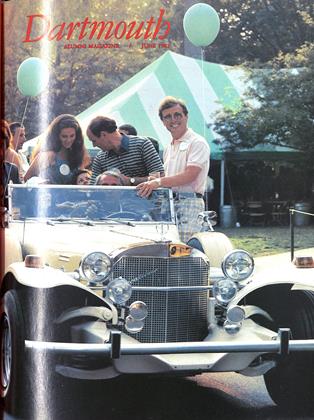HANDKERCHIEF MOODY: The Diary & The Man by Philip Mclntire Woodwell '17 Privately published. 1981. 260 pp. $14.00
Surely there can't be a single town along the coast of New England that doesn't have at least one Handkerchief Moody of its own tucked away somewhere in its long history. For the Handkerchief Moodys of New England are both legion and legendary. Whatever their local habitation or name, they are a recognizable type: the archetypal New England town "characters," those homegrown oddballs whose eccentricities in life assured their posthumous survival first in local legend and then, in the course of time, in the sober print of town histories.
Philip Woodwell's Handkerchief Moody is York, Maine's, particular version of the archetype, and Woodwell's biographical account of him demonstrates that Moody clearly deserves his modest niche in the well-populated pantheon of New England eccentrics. Born Joseph Moody in 1700, son of a distinguished cleric and grand-nephew of the famed Judge Samuel Sewall who presided over the Salem witchcraft trials, he was a considerable personage in Colonial New England. Raised in the harsh hellfire-andbrimstone Puritan tradition of Jonathan Edwards or Cotton Mather, he went, predictably, to Harvard, became a clergyman and, eventually, pastor of the Second Parish Congregational Church of York. He earned his singular sobriquet when, in 1738—1739, he habitually conducted divine services and preached from his pulpit wearing a large white handkerchief which, draped from ear to ear across his forehead, completely concealed his face.
That did it: "Handkerchief Moody" he forthwith became; the pseudonym stuck, and thus was he transmitted into local legend. Indeed, his fame was said to have extended well beyond his native York, for it was widely accepted that almost a century later, down in faraway Salem, Massachusetts, Nathaniel Hawthorne heard the still-extant story of the eccentric Maine clergyman and modeled his fictional protagonist in The Minister's Black Veil on Handkerchief Moody (a legend which, it must be noted, Woodwell convincingly demolishes).
Woodwell is as skillful and lucid a writer as he is a meticulous scholar. His interpretive biography of Handkerchief Moody the first of its kind is, in a word, definitive. Significance enough for one book, you might think. But there's more, a great deal more. In his book Woodwell also prints for the first time a diary that Moody maintained for over four years during the early 17205. Discovered a few years ago among the archives of the Maine State Historical Society, the diary presented a formidable challenge. Obsessively secretive he was eccentric in more ways than one, it would seem Moody had not only composed his diary in Latin but then had also taken pains to code his own Latin by setting "the entries down in a substitution cipher, each letter of the alphabet having a special symbol of its own." First, then, came the laborious job of decoding the entire work into "normal" Latin, secondly the delicate task of translating the Latin English that would not only retain th flavor of Moody's 18th-century language but at the same time would not grate comfortably on the ears of 20th-century readers. All this Woodwell did, and mole
Without detracting one whit from his achievement as biographer, it may nevertheless be surmised that his translation and publication of the diary may stand as Woodwell's more significant achievement. In making the diary accessible to modern readers Woodwell has provided an important primary-source document for the whole field of American Colonial history. For the diary is, as Professor Donalc Junkins notes in his introduction to the work, "a book of minor wonders that add up to a significant contribution to early 18th century Americana."
In view of the extraordinary lengths to which he went to keep his diary entries from prying eyes, Handkerchief Moody would no doubt be horrified to know that his code had been cracked, his diary published for all to read, the more so because some of the revelations in it are a good deal more intimate than Parson Moody would have considered seemly. But amateur history buffs, to say nothing of professions; Colonial historians, can only be grateful for the diligence and skill of Philip Woodwell.
 View Full Issue
View Full Issue
More From This Issue
-
 Feature
FeatureThe Lovinses and the Soft-Energy Path
June 1982 By Rob Eshman '82 -
 Feature
FeatureMAIN STREET
June 1982 By Nancy Wasserman -
 Cover Story
Cover StoryWarming up for 50 years: The yeast of elderly innocence
June 1982 -
 Class Notes
Class Notes1932
June 1982 By Adrian A. Walser -
 Sports
SportsBig Enough
June 1982 By Brad Hills '65 -
 Class Notes
Class Notes1948
June 1982 By Francis R. Drury Jr.
R. H. R.
-
 Article
ArticleNotes on a Distinguished Defendant and the Supreme Court’s Great non-decision
DEC. 1977 By R. H. R. -
 Books
BooksNotes on lost causes and an enlistment against Nature, as brave as it was brief.
March 1979 By R. H. R. -
 Books
BooksMythogenic
JAN./FEB. 1980 By R. H. R. -
 Books
BooksIntolerable Ambiguity
November 1980 By R. H. R. -
 Books
BooksWood Butchers
June 1981 By R. H. R. -
 Books
BooksNot for Art's Sake
APRIL 1982 By R. H. R.
Books
-
 Books
BooksThe Classical Weekly
FEBRUARY 1932 -
 Books
BooksShelflife
Jan/Feb 2009 -
 Books
BooksPEPPERFOOT OF THURSDAY MARKET
June 1941 By Herbert F. West '22 -
 Books
BooksPSYCHOLOGY OF ADVERTISING
April 1938 By Irving E. Bender. -
 Books
BooksBriefly Noted
OCTOBER 1969 By J.H. -
 Books
BooksTHREE BOOKS ON RELIGION. RELIGION
APRIL 1930 By William Kelley Wright


